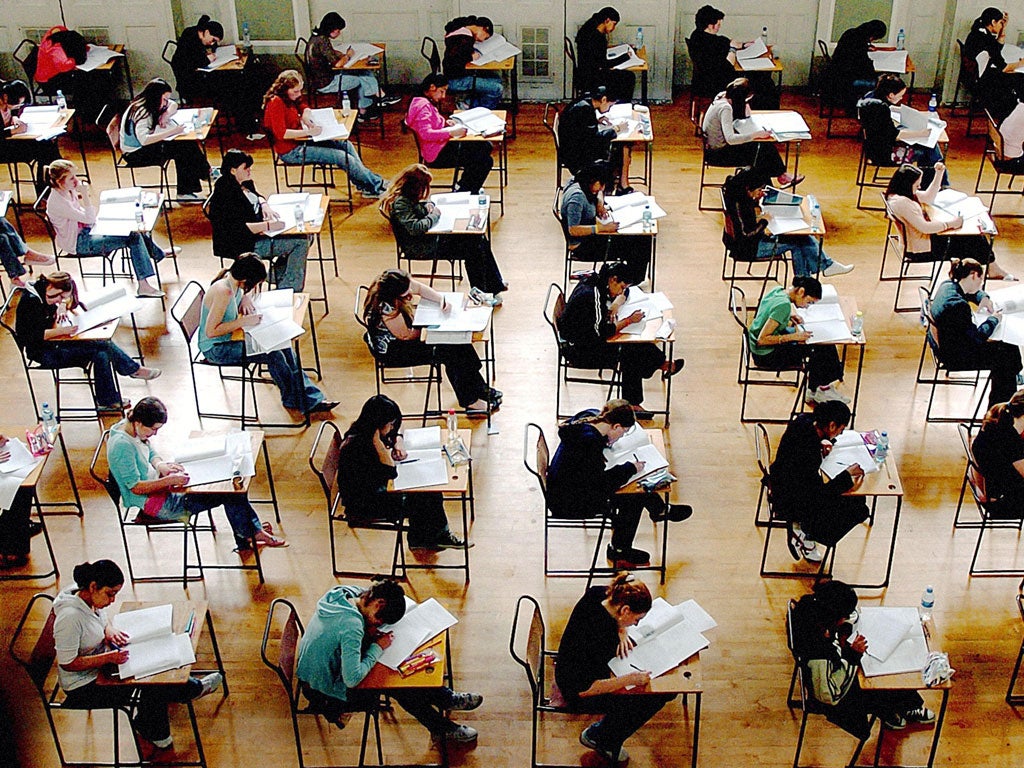Watchdog acts after furore on GCSE pass-rate
Academics call for an inquiry as rise in required mark for C grade English penalises up to 10,000

The exams watchdog announced yesterday it would investigate the furore over GCSE English grade boundaries after it emerged up to 10,000 teenagers could have lost out on sixth-form and college places as a result of the last-minute changes.
Glenys Stacey, chief executive of Ofqual, the exams regulator, said it would "look closely" at the concerns over GCSE grade boundaries. "We recognise the continuing concerns among students, parents and teachers about this year's GCSE English results," she said in a letter to Russell Hobby, general secretary of the National Association of Head Teachers, who had demanded an independent inquiry into the affair.
"We will look closely at how the results were arrived at. We will do this quickly but thoroughly so that we ensure confidence is maintained in the examination system."
The decision by Ofqual to investigate the affair may not be enough to satisfy all those demanding an inquiry because many believe its tough stance – and that of Education Secretary Michael Gove – over grade inflation backed the exam boards into a corner and led to the decision to shift grade boundaries up. Mr Gove has repeatedly denied bringing any influence on exam boards to raise the grade boundaries.
Leading academics have joined the chorus calling for an inquiry into the events which led to the grade boundary for a C pass being raised by as much as 12 per cent after thousands of candidates had already sat the exam in January.
Professor Alan Smithers, director of the Centre for Education and Employment Research at the University of Buckingham and a senior adviser to the Commons Education Select Committee, said estimates showed about 10,000 candidates who would have got a C grade ended up without one. The numbers getting A* to C grades in English dropped by 1.5 per cent this year.
He told Radio 4's Today programme that it was necessary for "someone – a respected person – to go in there and tell us what has happened" as the decision would have "drastic consequences".
Sir Mike Tomlinson, who headed an earlier inquiry a decade ago into grade inflation, also echoed the call for an inquiry, and Stephen Twigg, Labour's education spokesman, called on Mr Gove to order an investigation into the affair.
David Stucke, a deputy head teacher from Manchester, accused AQA – the biggest exam board – of attempting to fix the pass rate "with all the finesse of a heavyweight boxer". He said the board may have realised that it had set the pass mark for those who sat the exam in January too low – and then attempted to fix it. "The goalposts were indeed moved and made smaller and that's simply unfair," he said.
A C-grade pass, particularly in English, is "high stakes" both for students and schools. Without it, many students will be unable to take up sixth-form and college places and head teachers could face the sack, with their schools forced to close or become academies if they do not reach the Government's floor target of 40 per cent of pupils getting five A* to C-grade passes at GCSE, including maths and English.
Some schools and local authorities are considering legal action, saying that the decision has implications under equality legislation. Students most disadvantaged by the changes were from ethnic minority families with English as a second language or from poorer communities who would have gained a C-grade pass had they sat the exam in January.
Graham Stuart, the Tory chairman of the Commons Select Committee on Education, is particularly worried about plans to turn GCSEs and A-levels into a franchise operation – whereby each subject will be delivered by one exam board. "I'd be very concerned about any attempt to rush into this without any real public discussion or debate," he said.
At present, the three biggest exam boards all compete with each other for schools' custom. However, if the Government moved to a franchise operation, the board that won it would have to deal with three times the number of candidates, whereas those that lost out would lose a large chunk of their business. "The Government originally wanted to move quickly to award the franchises before Christmas," he said, "but that just isn't possible now. The awarding of franchises without careful consideration could be disastrous."
Other options include a single exam board for the whole country or the current system of exam boards competing for custom.
Join our commenting forum
Join thought-provoking conversations, follow other Independent readers and see their replies
Comments